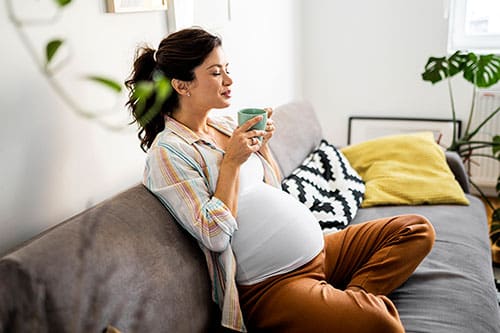
Many women wonder, “How does caffeine affect my baby and me during pregnancy?” Drinking caffeine can make your heart beat faster and raise your blood pressure. It also makes you pee more. Sometimes, it can make you feel shaky, have a stomach ache, or find it hard to sleep.
Caffeine can affect you even more when you’re pregnant because it takes longer for your body to get rid of it. It could make you feel sick or dizzy.
When you drink caffeine while pregnant, it reaches your baby through the placenta, an organ that gives your baby food and oxygen through the umbilical cord.
Caffeine affects your calcium metabolism and your baby’s, too. If you drink caffeine during your pregnancy, you may experience irritability, headaches, stomach upset, sleeplessness, and jitters. Smoking can increase the stimulant effect of the caffeine.
There are other reasons to cut back on caffeine: it has a diuretic effect, meaning that fluid and calcium (nutrients that are very important to your health and your baby’s health) leave your body more quickly.
If you’re already finding that you need to urinate frequently, drinking coffee will only make that worse. Plus, coffee with cream and sugar is filling and satisfying without having nutritional value and can ruin your appetite for the healthy food you need. Too much caffeine can keep you from getting enough rest, especially if you drink it after noon.
How much caffeine is safe during pregnancy?
Research has shown that pregnant women are more sensitive to caffeine. You may have heard that having too much caffeine while pregnant can lead to a baby being born too early, being too small, or even miscarriage. Some studies agree, but others don’t.
Drinking caffeine while pregnant seems to fall into the category of “when in doubt, leave it out.” To be safe, it’s best not to have more than 200 milligrams of caffeine each day when you’re pregnant. That’s about what you’d find in one and a half small cups of coffee or one regular-sized cup.
Check the size of your cup to make sure you know how much caffeine is in your drink. You may also consider reducing or eliminating caffeine intake during pregnancy and opting for alternative energy boosts that do not pass through the placenta.
Keep in mind that caffeine isn’t just in coffee: soft drinks, tea, coffee-flavored yogurt, and chocolate also contain it. Dark coffee sold at coffee houses contains more caffeine than coffee you brew at home. Also, instant coffee has less caffeine than drip coffee.
Weaning off caffeine to a more natural pick-me-up
You can reduce your caffeine intake by choosing a decaffeinated replacement – just don’t let it replace milk, orange juice, or other healthy beverages. Many women experiencing pregnancy-related exhaustion feel they need the “pick-me-up” that drinking coffee in the morning provides.
If this sounds like you,, consider using exercise and nutritious food for a more natural, longer-lasting boost. Ease off coffee gradually if you were a heavy coffee drinker before your pregnancy so you don’t experience withdrawal symptoms too severely.
If you’re accustomed to relying on caffeine for a daily energy boost, transitioning to more natural alternatives can benefit you and your baby. Here are some strategies to help ease the shift:
- Brew coffee or steep tea for shorter durations.
- Explore caffeine-free herbal teas.
While decaffeinated teas and coffees still contain trace amounts of caffeine, herbal teas provide a caffeine-free option. Opt for water-processed decaffeinated coffee over chemically processed alternatives to avoid harmful chemicals. - Check the labels of over-the-counter medications.
Many headache remedies contain caffeine, so be sure to read the labels before taking them. - Be aware of the caffeine content in beverages.
Take the time to read soda can labels or ask about the caffeine content of soft drinks before consuming them.
Experiment with other warm beverages. - If you enjoy the warmth of your drink, consider alternatives such as hot water with lemon, warm milk, hot apple cider, or herbal tea. Here are a few pregnancy-safe teas you’ll love.
- Gradually reduce caffeine intake.
If you find it challenging to start your day without your usual caffeine fix, taper off slowly. Begin by brewing your coffee with a blend of half-decaffeinated and half-regular coffee, then gradually decrease the proportion of caffeine. Even a small amount of caffeine can help alleviate withdrawal headaches.
When making tea, steeping it for only a minute releases half the caffeine compared to steeping it for five minutes. Generally, the longer coffee and tea are brewed and the darker the chocolate, the higher the caffeine content.
By implementing these gradual adjustments, you can ease your dependence on caffeine while still enjoying comforting beverages to start your day.
Caffeine During Pregnancy
Most healthcare professionals agree that up to two cups of regular coffee a day is fine, but make sure to ask your doctor. Your smartest bet is to try not to drink too much coffee. It’s healthier for your baby, and you’ll probably feel better. Also, read the labels on your over-the-counter medications to check for caffeine.
If this information helped you, you might also like these other “Is it safe?” pregnancy blogs:
Is Hair Coloring Safe During Pregnancy?
Can You Take Benadryl While Pregnant?
Pregnancy-Safe Skincare Products
Shampoos that are safe to use during pregnancy
“Should I get the COVID-19 vaccine if I’m pregnant?”
Editor’s Note: This article was originally published on December 13, 2013, and has since been updated.

